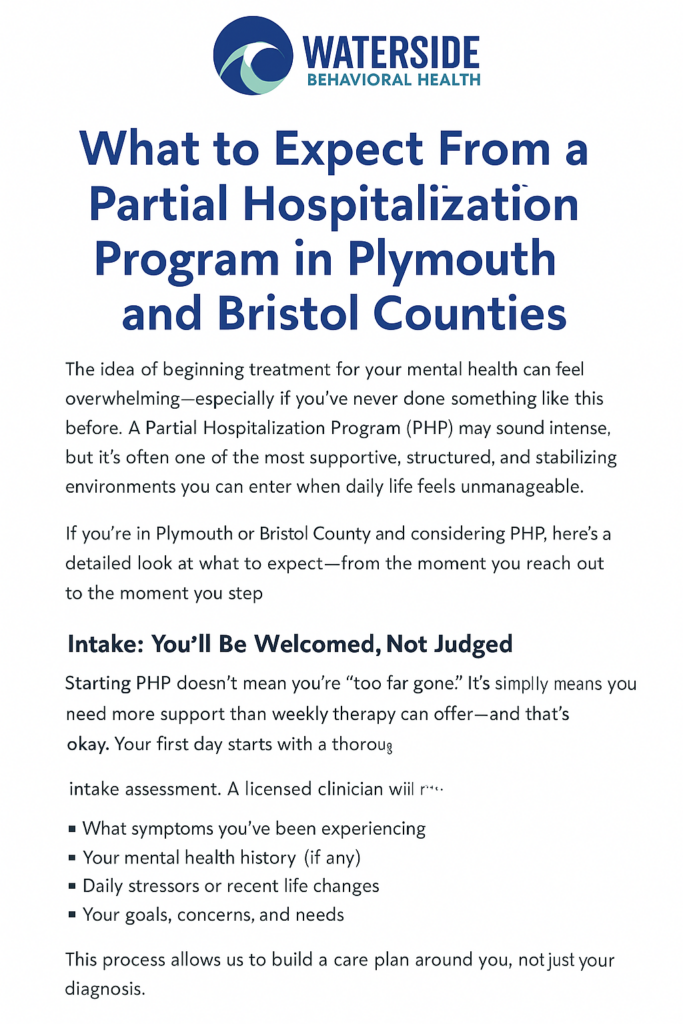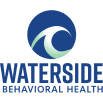The idea of beginning treatment for your mental health can feel overwhelming—especially if you’ve never done anything like this before. A Partial Hospitalization Program (PHP) may sound intense, but it’s often one of the most supportive, structured, and stabilizing environments you can enter when daily life feels unmanageable.
If you’re in Plymouth or Bristol County and considering PHP, here’s a detailed look at what to expect—from the moment you reach out to the moment you step back into your everyday life with a stronger foundation.
1. Intake: You’ll Be Welcomed, Not Judged
Starting PHP doesn’t mean you’re “too far gone.” It simply means you need more support than weekly therapy can offer—and that’s okay.
Your first day starts with a thorough intake assessment. A licensed clinician will meet with you privately to understand what’s bringing you in. This isn’t a test. You don’t need the “right” words. Just honesty. You’ll talk about:
- What symptoms you’ve been experiencing
- Your mental health history (if any)
- Daily stressors or recent life changes
- Your goals, concerns, and needs
This process allows us to build a care plan around you, not just your diagnosis.
2. A Consistent Daily Schedule That Promotes Stability
One of the biggest gifts PHP offers is routine. The program typically runs Monday through Friday, around 9 a.m. to 3 p.m. Some programs may offer slight variations, but the goal is consistent: structure without confinement.
Each day includes:
- Group therapy sessions led by licensed professionals
- Psychoeducation, where you learn tools for managing emotions and building resilience
- Breaks, lunch, and self-reflection time
The predictability can be a huge relief when your inner world feels unpredictable. It helps retrain your mind and body toward a steadier rhythm.
3. Group Therapy: A Safe Place to Learn, Not Perform
For many first-time clients, group therapy is the most unfamiliar part. It’s easy to imagine awkward silence—or worse, forced vulnerability.
But that’s not how PHP groups work. Sessions are professionally facilitated and focused on themes that are highly relevant, such as:
- Managing anxiety and panic
- Coping with depression
- Understanding trauma responses
- Setting healthy boundaries
- Navigating relationships and communication
You don’t have to share before you’re ready. Many clients begin by listening, absorbing, and slowly becoming more comfortable. The group becomes a source of peer support—people who get it, without judgment.
4. Individual Therapy: One-on-One Support That Goes Deeper
In addition to daily group sessions, you’ll meet with an individual therapist at least once a week. These sessions are tailored to you and allow for deeper exploration of:
- Root causes of your distress
- Past experiences that still affect you
- Goals for your recovery
- Any fears or barriers you’re working through
This is your space. Your pace. Your process.
If you’ve never had therapy before, know this: a good therapist will never pressure you to talk about things you’re not ready for. The goal is safety and trust—not speed.

5. Transition Planning: Preparing for What Comes Next
PHP is not a permanent solution—but it is a powerful reset.
As you progress, your care team will begin working with you on discharge planning. This isn’t about “kicking you out.” It’s about making sure you have the right supports after PHP, such as:
- Stepping down to an Intensive Outpatient Program (IOP)
- Connecting with a community-based therapist
- Medication management if appropriate
- Coping tools and crisis plans for the future
This transition is part of the treatment—not an afterthought. We don’t just help you feel better. We help you stay better.
Healing in Your Own Backyard
If you live in Plymouth or Bristol County, you don’t have to travel far to access high-quality care. Local programs understand the unique pressures of our communities—whether you’re balancing family, commuting, or just trying to keep your head above water.
Waterside Behavioral Health offers a Partial Hospitalization Program in Massachusetts that’s rooted in compassion, clinical excellence, and true respect for where you are today.
You don’t need to feel ready forever. You just need to feel ready enough to start.
Frequently Asked Questions About PHP
What’s the difference between PHP and inpatient care?
PHP allows you to return home at night, while inpatient (or residential) care involves living at the facility 24/7. PHP is best for people who need more than weekly therapy but don’t require overnight monitoring.
Do I need a diagnosis to start PHP?
No. Many clients enter PHP before they have a formal diagnosis. The intake team will help determine what you’re dealing with and what supports make sense.
Will my insurance cover PHP?
Most insurance plans, including MassHealth and commercial providers, offer some coverage for PHP. Our admissions team can help you verify your benefits and understand your options.
Can I work or go to school while in PHP?
PHP is a significant time commitment (typically five hours a day, five days a week), so full-time work or school is usually paused. Some people adjust their schedule or take leave if possible.
How long does PHP last?
The average length is 2–4 weeks, but it can vary based on individual progress. Your team will check in with you regularly to adjust the plan as needed.
📞 Ready to Talk?
You don’t have to do this alone. If you’re considering a Partial Hospitalization Program in Plymouth or Bristol County, we’re here to answer every question—without pressure.
Call us at (774) 619-7750. We’ll walk you through what’s next, at your pace.




